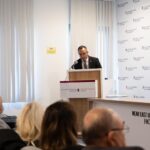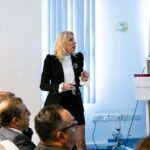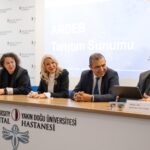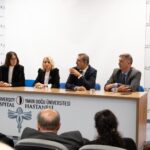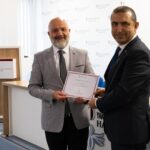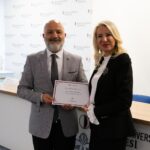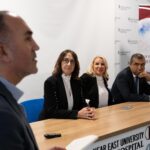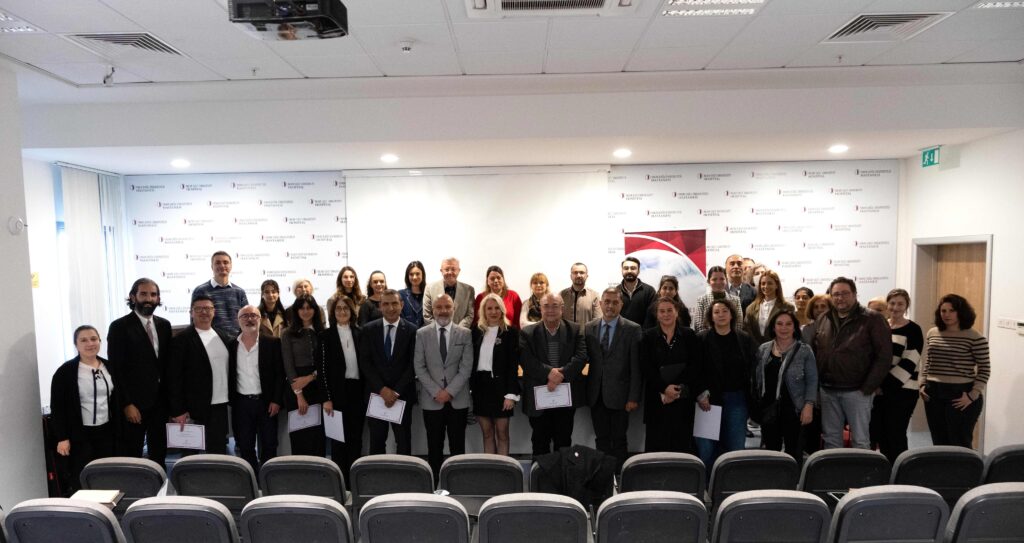
The “Project Applications: Processes and Tips Symposium” organized at Near East University was held with the aim of creating a roadmap for academics in TRNC, where subject restrictions for TÜBİTAK project applications have been lifted.
The “Project Applications: Processes and Tips Symposium” organized at Near East University with the participation of Assoc. Prof. Dr. Cengiz Arıcı, Deputy Vice President of TÜBİTAK Research Support Programs Presidency (ARDEB) and Behcet Çelebi, Director of the Higher Education and Foreign Relations Department of the Ministry of National Education, was held with the intense participation of academics.
The event organized by the Near East University Experimental Health Sciences Research Institute (DESAM) for academics was held with the aim of strongly integrating scientific research in the country into the TÜBİTAK ecosystem after TÜBİTAK project calls were opened to the TRNC universities and researchers. The event was attended by TÜBİTAK Health Research Support Group Member Prof. Dr. Gamze Tanrıöver and Prof. Dr. Murat Özgören, a member of the TÜBİTAK Research and Development Incentives Presidency (ARGES) who is also the Head of the Near East University Technology Transfer Office. The symposium, which was held in three separate sessions consisting of the titles “TÜBİTAK”, “Near East University- Scientific Research Projects (BAP), Project Processes and Other Funding Sources” and “Let’s Discuss Together”, provided an important platform for researchers and academicians on the planning, execution and funding of scientific projects that will apply to TÜBİTAK calls.
The Secrets of TÜBİTAK Projects Were Discussed
In the first session, moderated by Prof. Dr. Mehmet Öztürk, Head of the Near East University Synthetic Biology Research and Technology Center, TÜBİTAK ARDEB Deputy Vice President Assoc. Prof. Dr. Cengiz Arıcı explained the TÜBİTAK ARDEB project application processes in detail. Assoc. Prof. Dr. Cengiz Arıcı informed the researchers that he was pleased to share TÜBİTAK projects and important points. TÜBİTAK Health Sciences Research Group Board Member Prof. Dr. Gamze Tanrıöver provided information on critical and important points in project writing. In addition, Near East University faculty member Assoc. Prof. Dr. Selin Deliceırmak, who received the acceptance of TÜBİTAK 2024 2nd term 1001 project applications, shared her experiences in the project application and subsequent processes with the participants.
In the second session, the “Near East University BAP Project Processes and Other Funding Sources” panel was held under the chair of Near East University DESAM Research Institute Board Member and Scientific Research Projects Coordinator Prof. Dr. H. Seda Vatansever. The panel included Near East University Scientific Research Projects Board Members Assoc. Prof. Dr. Ayşe Arıkan Sarıoğlu, Prof. Dr. Güney Yılmaz, Prof. Dr. Ulaş Yavuz and NERİTA President Prof. Dr. Murat Özgören, the evaluation processes of BAP project applications funded by Near East University, the difficulties encountered were conveyed, and questions were answered. In addition, detailed information was shared about other funding sources that Near East University researchers can benefit from. In the “Let’s Discuss Together” session held in the closing section of the event, participants exchanged views based on the information they obtained during the symposium. This section provided an important roadmap for academics regarding the writing, management and funding of projects.
Behcet Çelebi: “Quality is an important element that we desire in higher education and want to increase day by day.”
Behcet Çelebi, Director of the Higher Education and Foreign Relations Department of the Ministry of National Education, who made the opening speech of the symposium, emphasized the importance of TÜBİTAK projects in terms of increasing the quality of higher education and the production of knowledge. Stating that funding sources pose a great challenge for the TRNC, Çelebi said that the cooperation with TÜBİTAK is important for this reason. Çelebi said, “Producing knowledge with limited funding is very important for us. Again, the quality included in the project definition is an important element that we desire in higher education and want to increase day by day.” Çelebi reminded that as a result of the meetings held with TÜBİTAK officials in Ankara, the protocol made between the Ministry of National Education and TÜBİTAK in 2023 was re-signed in 2024 so that the TRNC universities could take a more active part in the project processes and all research areas were opened to the TRNC researchers, and stated that this process was an important development for TRNC universities.
Çelebi, who emphasized that as of 2025, the subject restrictions in project applications will be lifted and TRNC universities will be able to receive support in every field, stated that financial support is provided for scientific projects by establishing contacts with the Embassy of the Republic of Turkey in Nicosia and the Development and Economic Cooperation (BSEC) office. Behcet Çelebi, who said that local resources are allocated for TÜBİTAK projects in the TRNC budget and that this will make a significant contribution to the knowledge production process, said, “We are working with all our might to continue on the path of quality increase, knowledge production and efficiency triangle.” and at the end of his speech, Çelebi emphasized that the symposium is very important for the TRNC higher education and thanked those who contributed.
